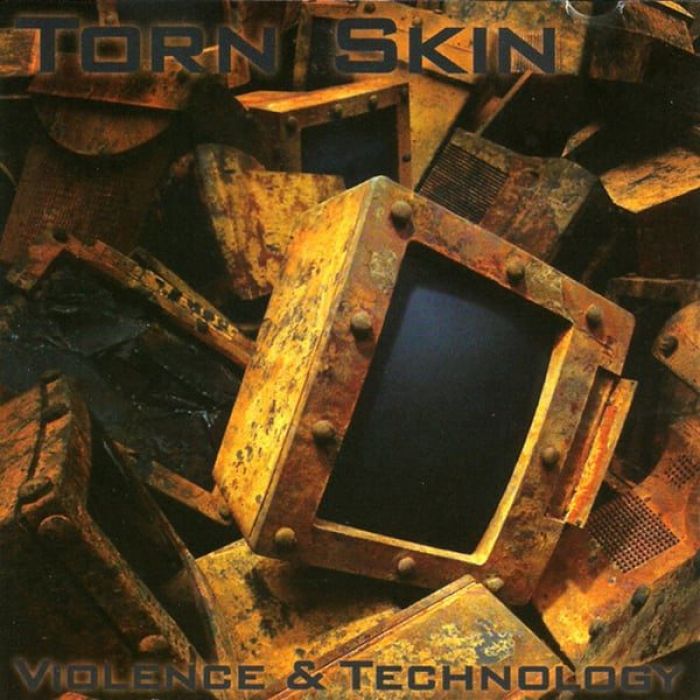Violence & Technology by Torn Skin (Review)

I was a little apprehensive about reviewing this CD, mainly due to the fact that I’ve been out of industrial music for quite some time. I first started getting exposed to the genre back in high school, through the likes of more well-known acts such as Ministry and Nine Inch Nails. And in my early college years, I began to explore the genre a bit more. However, industrial music was essentially a steppingstone, setting me on the path to more esoteric artists such as Pyschic TV, Nurse With Wound, 23 Skiddoo, Coil, and The Hafler Trio.
Also, as far as “electronic” genres went, industrial slowly grew less and less interesting, especially when I discovered the likes of Warp. Artists such as Aphex Twin and Autechre truly felt revolutionary to me, pushing electronic music in bold new directions. Compared to them, the minions of the industrial scene felt stagnant, too mired in their obsession with angst and dark imagery to offer anything fresh and exciting musically.
So when I popped in Violence & Technology, I had a fair amount of trepidation. Would I hear the same old stuff I’d heard back in 1993 – 94, when I was an angst-ridden teenager trying to pass off poor imitations of Cure and NIN songs as meaningful poetry? Or would I hear something new and exciting, something that might still perk up my ears after years of building a whole new musical vocabulary?
The answer to both of those questions, as it turns out, was “Yes.”
There is much on Violence & Technology that is exactly what I expected to hear. Dark, angry guitar riffs heavy enough to leave a mark pummel throughout tracks such as “Hypnotic Agenda.” The band’s synths either create bruised atmospherics or fill the songs with icy, lacerating edges (“Remote Control”). There’s very little finesse to the band’s programming; rather, the focus seems to be on pounding the listener into submission (“Disintegration”). And as can be expected, the lyrical subject gets pretty dark, focusing on topics such as man’s sinfulness, imprisonment, and helplessness, and is delivered by Drew Calvette and Rob Buhl’s tortured, whispered vocals.
There were moments on the disc where I felt like I had somehow been transported back to my bedroom in 1994, with the likes of Circle of Dust and Argyle Park flooding in over the headphones. But there were plenty of moments where Violence & Technology became a rather invigorating listen, as the band wove in (at least what seemed to me to be) some fairly non-standard industrial elements into their music.
Songs like “Remote Control” reveal the band has been paying attention to the recent electroclash uprising. Containing a potent mixture of breakbeats and jagged synthwork, the song is dominated by Calvette’s guitarwork, and the result sounds like something The Faint might release if they let Dapose’s metal background dominate their sound a bit more. The song’s “Medulla Oblongata” remix minimizes the guitars, and the band instead opts to strangle the breakbeats and torture the synths to within an inch of their lives (and it sounds great).
But the biggest surprise of the disc, the one moment that really made me sit up and take notice occurs on “Resist.” The song whips along at a good clip, goaded on by a flurry of 808-style bleeps and gurgles, with distorted guitars and vocoderized vocals nipping at its heels.
Suddenly, the song pauses, and an entirely different sound emerges. Graceful, ringing guitars begin to shimmer forth, causing me to wonder if Torn Skin aren’t closet Cocteau Twins fans. Of course, the heavy riffage soon re-surfaces and the song reverts to a flurry of synths, laser gun sounds, and distorted guitars. But that one brief moment, where the band feels free enough to toss out something I did not expect at all from an industrial band, does much to renew and lift up the entire disc.